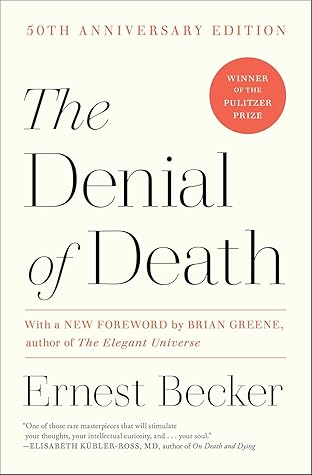More on this book
Community
Kindle Notes & Highlights
The basic motivation for human behavior is our biological need to control our basic anxiety, to deny the terror of death. Human beings are naturally anxious because we are ultimately helpless and abandoned in a world where we are fated to die. “This is the terror: to have emerged from nothing, to have a name, consciousness of self, deep inner feelings, an excruciating inner yearning for life and self-expression—and with all this yet to die.”
Society provides the second line of defense against our natural impotence by creating a hero system that allows us to believe that we transcend death by participating in something of lasting worth. We achieve ersatz immortality by sacrificing ourselves to conquer an empire, to build a temple, to write a book, to establish a family, to accumulate a fortune, to further progress and prosperity, to create an information-society and global free market.
If you took a blind and dumb organism and gave it self-consciousness and a name, if you made it stand out of nature and know consciously that it was unique, then you would have narcissism.
We might say that his repression of the idea of his own death is made easy for him because he is fortified against it in his very narcissistic vitality.
Man is literally split in two: he has an awareness of his own splendid uniqueness in that he sticks out of nature with a towering majesty, and yet he goes back into the ground a few feet in order blindly and dumbly to rot and disappear forever.
Anality and its problems arise in childhood because it is then that the child already makes the alarming discovery that his body is strange and fallible and has a definite ascendancy over him by its demands and needs. Try as he may to take the greatest flights of fancy, he must always come back to it. Strangest and most degrading of all is the discovery that the body has, located in the lower rear and out of sight, a hole from which stinking smells emerge and even more, a stinking substance—most disagreeable to everyone else and eventually even to the child himself.
To say that someone is “anal” means that someone is trying extra-hard to protect himself against the accidents of life and danger of death, trying to use the symbols of culture as a sure means of triumph over natural mystery, trying to pass himself off as anything but an animal.
As Kierkegaard taught us, anxiety lures us on, becomes the spur to much of our energetic activity: we flirt with our own growth, but also dishonestly. This explains much of the friction in our lives. We enter symbiotic relationships in order to get the security we need, in order to get relief from our anxieties, our aloneness and helplessness; but these relationships also bind us, they enslave us even further because they support the lie we have fashioned.
As Ortega so well put it in the epigraph we have used for this chapter, man uses his ideas for the defense of his existence, to frighten away reality.
The irony of man’s condition is that the deepest need is to be free of the anxiety of death and annihilation; but it is life itself which awakens it, and so we must shrink from being fully alive.
The fall into self-consciousness, the emergence from comfortable ignorance in nature, had one great penalty for man: it gave him dread, or anxiety.
Man’s anxiety is a function of his sheer ambiguity and of his complete powerlessness to overcome that ambiguity, to be straightforwardly an animal or an angel. He cannot live heedless of his fate, nor can he take sure control over that fate and triumph over it by being outside the human condition:
Man breaks through the bounds of merely cultural heroism; he destroys the character lie that had him perform as a hero in the everyday social scheme of things; and by doing so he opens himself up to infinity, to the possibility of cosmic heroism, to the very service of God. His life thereby acquires ultimate value in place of merely social and cultural, historical value. He links his secret inner self, his authentic talent, his deepest feelings of uniqueness, his inner yearning for absolute significance, to the very ground of creation. Out of the ruins of the broken cultural self there remains
...more
On the one hand the creature is impelled by a powerful desire to identify with the cosmic process, to merge himself with the rest of nature. On the other hand he wants to be unique, to stand out as something different and apart. The first motive—to merge and lose oneself in something larger—comes from man’s horror of isolation, of being thrust back upon his own feeble energies alone; he feels tremblingly small and impotent in the face of transcendent nature. If he gives in to his natural feeling of cosmic dependence, the desire to be part of something bigger, it puts him at peace and at
...more
What typifies the neurotic is that he “knows” his situation vis-à-vis reality. He has no doubts; there is nothing you can say to sway him, to give him hope or trust. He is a miserable animal whose body decays, who will die, who will pass into dust and oblivion, disappear forever not only in this world but in all the possible dimensions of the universe, whose life serves no conceivable purpose, who may as well not have been born, and so on and so forth.
Rank prescribed the cure for neurosis: as the “need for legitimate foolishness.”
In other words, perversion is a protest against species sameness, against submergence of the individuality into the body. It is even a focus of personal freedom vis-à-vis the family, one’s own secret way of affirming himself against all standardization.


